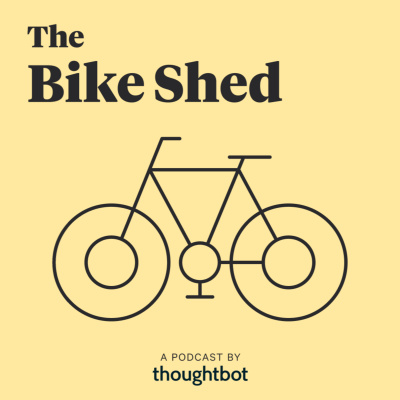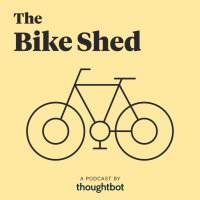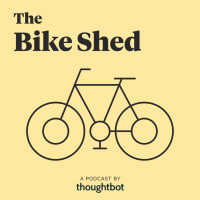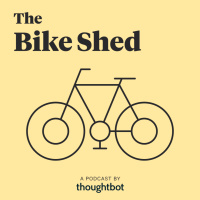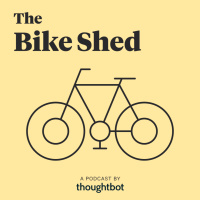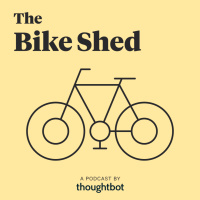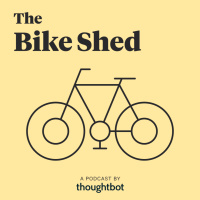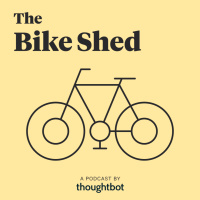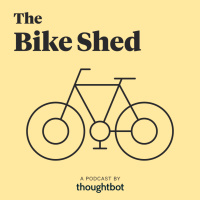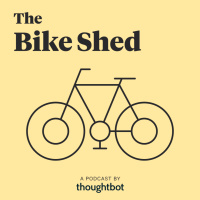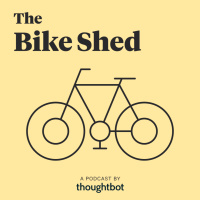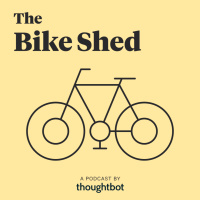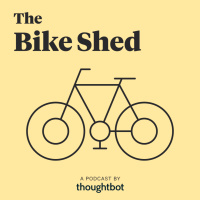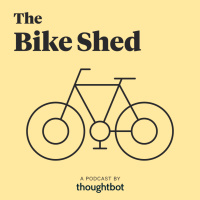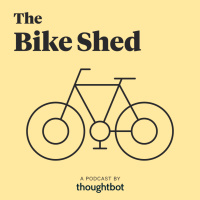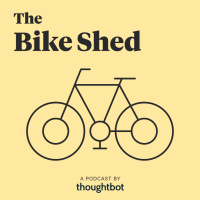Sinopsis
On The Bike Shed, hosts Derek Prior, Sean Griffin, Amanda Hill, and guests discuss their development experience and challenges with Ruby, Rails, JavaScript, and whatever else is drawing their attention, admiration, or ire this week.
Episodios
-
438: Writing abstractions in tests
03/09/2024 Duración: 49minWriting abstractions in tests can be surprisingly similar to storytelling. The most masterful stories are those where the author has stripped away all of the extra information, and given you just enough knowledge to be immersed and aware of what is going on. But striking that balance can be tricky, both in storytelling and abstractions in tests. Too much information and you risk overwhelming the reader. Too little and they won’t understand why things are operating the way they are. Today, Stephanie and Joël get into some of the more controversial practices around testing, why people use them, and how to strike the right balance with your information. They discuss the most common motivations for introducing abstractions, from improved readability to simplifying the test’s purpose and the types of tests where they are most likely to introduce abstractions. Our hosts also reflect on how they feel about different abstractions in tests – like custom matchers and shared examples – outlining when they reach for them
-
437: Contributing to Open Source in the Midst of Daily Work with Steve Polito
27/08/2024 Duración: 35minAre you passionate about open source but struggling to find time amidst your daily work? Today on the podcast, Joël Quenneville sits down with Steve Polito to discuss practical strategies for making meaningful contributions to the open-source community, even when your schedule is packed. Steve is a developer with extensive experience in the open-source world seamlessly. He’s known for his ability to integrate open-source contributions into his daily workflow, all while maintaining high productivity in his professional role. In our conversation, we explore balancing professional responsibilities with open-source contributions. Steve walks us through his process, from the importance of keeping notes to leveraging Rails issue templates. Discover strategies for contributing to open-source work during work hours, the benefits of utilizing existing processes, and why extending the success of your work to the larger developer community is essential. Join us to hear recommendations for handling pull requests with Rub
-
436: Creating Conditions For Your Best Work with Steph Viccari
13/08/2024 Duración: 43minHow can we optimize our time and environment to do our best work as developers? In today’s episode, we are joined by Stephanie Viccari, former co-host of The Bike Shed and Senior Developer at thoughtbot, to unpack the steps for creating work conditions that enhance productivity. In this conversation, we delve into her unique communication style and approach to optimizing productivity within a team. She explains why she decided to hang up her consulting hat and join the product team at Cisco Meraki, her new role there, and how her consulting skills benefit her new position. Tuning in, you’ll discover the key to empathetic communication, how to unblock yourself, tips to help you navigate different communication styles, and why you should advocate for your needs. Stephanie also shares strategies for effective communication and recommendations for managing ‘deep work’ when your time is limited. Gain valuable insights into how to uncover what makes your skillset unique, why it takes a team to manage complex softwa
-
435: Cohesive Code with Jared Norman
30/07/2024 Duración: 28minHow easy is it for a layperson to understand your systems? Jared Norman is a software consultant, speaker, and host of the Dead Code Podcast who specializes in building e-commerce applications in Ruby on Rails. This episode follows two recent talks at RailsConf and covers a theme that emerged from both of them: coupling and cohesion. Tuning in, you’ll gain insights on how to create more cohesive components to allow for change and improve your understanding of value objects, systems, and more. You’ll also hear about navigating the complexity of domain-driven design and learn how to gauge if your code is easy to understand through a simple rule of thumb. We discuss what it might look like to improve the cohesion of individual objects, identify your systems’ seams to create simplicity, and the liminal space between inheritance and composition and the role of decorators in moving through it. Join us today to hear all this and more! Key Points From This Episode: Introducing Jared Norman recent speaker at RailsCon
-
434: Git and GitHub Workflows
23/07/2024 Duración: 47minIt's Calls for Proposals (CFP) season, and in the process of helping our friends and colleagues flesh out their CFPs, we came up with a few questions to help them frame their proposals for success. After learning about the importance of finding your audience and angle of approach for your CFP, we dive into today's main topic – our Git and GitHub workflows. Joel and Stephanie walk us through their current workflows before exploring the differences between main branch and future branch commits. Then, we explore commits editing and why it's okay to make mistakes, commit messages versus GitHub pull requests (PR), what you need to know if you're new to Git, and what you need to understand about PR sizes and Git merge strategies. To end, Joel shares the commit messages that satisfy him the most, and we discover how to make one's life easier when reviewing PRs. Key Points From This Episode: Our CFP framework of questions to help you build a winning proposal. Why it's important to understand who your audience is and
-
433: Riffing with Kasper Timm Hansen
16/07/2024 Duración: 37minHave you ever wondered how improvisation can revolutionize coding? In today’s episode, Stephanie sits down with Kasper Timm Hansen to discuss his innovative “riffing” approach to code development. Kasper is a long-time Ruby developer and former member of the Rails core team. He focuses on Ruby and domain modeling, developing various Ruby gems, and providing consulting services in the developer space. He has become renowned for his approach of “riffing” to software development, particularly in the Ruby on Rails framework. In our conversation, we delve into his unique approach to coding, how it differs from traditional methods, and the benefits of improvisation to code development. Discover the “feeling” part of riffing, the steps to uncovering relationships between models, and why it is okay not to know how to do something. Explore how riffing enhances collaboration, improves communication with and between teams, identifies alternative code, why “clever code” does not make for good solutions, and much more! Tu
-
432: The Semantics and Meaning of Nil
09/07/2024 Duración: 38minThe term ‘nil’ refers to the absence of value, but we often imbue it with much more meaning than just that. Today, hosts Joël and Stephanie discuss the various ways we tend to project extra semantics onto nil and the implications of this before unpacking potential alternatives and trade-offs. Joël and Stephanie highlight some of the key ways programmers project additional meaning onto nil (and why), like when it’s used to create a guest session, and how this can lead to bugs, confusion, and poor user experiences. They discuss solutions to this problem, like introducing objects for improved readability, before taking a closer look at the implications of excessive guard clauses in code. Our hosts also explore the three-state Boolean problem, illustrating the pitfalls of using nullable Booleans, and why you should use default values in your database. Joël then shares insights from the Elm community and how it encourages rigorous checks and structured data modeling to manage nil values effectively. They advocate
-
431: Developers Are Professional Question Askers
02/07/2024 Duración: 38minStephanie shares her newfound interest in naming conventions, highlighting a resource called "Classnames" that provides valuable names for programming and design. Joël, in turn, talks about using AI to generate names for D&D characters, emphasizing how AI can help provide inspiration and reasoning behind name suggestions. Then, they shift to Joël's interest in Roman history, where he discusses a blog by a Roman historian that explores distinctions between state and non-state peoples in the ancient Mediterranean. Together, the hosts delve into the importance of asking questions as consultants and developers to understand workflows, question assumptions, and build trust for better onboarding. Stephanie categorizes questions by engagement stages and their social and technical aspects, while Joël highlights how questioning reveals implicit assumptions and speeds up learning. They stress maintaining a curious mindset, using questions during PR reviews, and working with junior developers to foster collaboration. Th
-
430: Test Suite Pain & Anti-Patterns
25/06/2024 Duración: 40minStephanie and Joël discuss the recent announcement of the call for proposals for RubyConf in November. Joël is working on his proposals and encouraging his colleagues at thoughtbot to participate, while Stephanie is excited about the conference being held in her hometown of Chicago! The conversation shifts to Stephanie's recent work, including completing a significant client project and her upcoming two-week refactoring assignment. She shares her enthusiasm for refactoring code to improve its structure and stability, even when it's not her own. Joël and Stephanie also discuss the everyday challenges of maintaining a test suite, such as slowness, flakiness, and excessive database requests. They discuss strategies to balance the test pyramid and adequately test critical paths. Finally, Joël emphasizes the importance of separating side effects from business logic to enhance testability and reduce complexity, and Stephanie highlights the need to address testing pain points and ensure tests add real value to the c
-
429: Transforming Experience Into Growth
18/06/2024 Duración: 43minStephanie has a newfound interest in urban foraging for serviceberries in Chicago. Joël discusses how he uses AI tools like ChatGPT to generate creative Dungeons & Dragons character concepts and backstories, which sparks a broader conversation with Stephanie about AI's role in enhancing the creative process. Together, the hosts delve into professional growth and experience, specifically how to leverage everyday work to foster growth as a software developer. They discuss the importance of self-reflection, note-taking, and synthesizing information to enhance learning and professional development. Stephanie shares her strategies for capturing weekly learnings, while Joël talks about his experiences using tools like Obsidian's mind maps to process and synthesize new information. This leads to a broader conversation on the value of active learning and how structured reflection can turn routine work experiences into meaningful professional growth. Obsidian (https://obsidian.md/) Zettelkasten (https://en.wikipedia.o
-
428: Ruminating on Ruby Enumerators
11/06/2024 Duración: 35minJoël explains his note-taking system, which he uses to capture his beliefs and thoughts about software development. Stephanie recalls feedback from her recent RailsConf talk, where her confidence stemmed from deeply believing in her material despite limited rehearsal. This leads to a conversation about the value of mental models in building a comprehensive understanding of a topic, which can foster confidence and adaptability during presentations and discussions. The episode then shifts focus to the practical application of enumerators in Ruby, exploring various mental models to understand their functionality better. Joël introduces several metaphors, such as enumerators as cursors, lazy collections, and sequence generators, which help demystify their use cases. Episode on note-taking (https://bikeshed.thoughtbot.com/357) What we believe about software (https://bikeshed.thoughtbot.com/172) Ruby Enumerators (https://ruby-doc.org/3.3.1/Enumerator.html) Enumerator Lazy (https://ruby-doc.org/3.3.1/Enumerator/Lazy
-
427: RailsConf Recap and Conversing About Coupling
28/05/2024 Duración: 37minJoël and Stephanie talk RailsConf! (https://railsconf.org/). Joël shares how he performed as a D&D character, Glittersense the gnome, to make his Turbo features talk entertaining and interactive. Stephanie's talk focused on addressing test pain by connecting it to code coupling, offering practical insights and solutions. They agree on the importance of continuous improvement as speakers and developers and trying new approaches in talks and code design, and recommend Jared Norman's RailsConf talk on design patterns, too! That One Thing: Reduce Coupling for More Scalable and Sustainable Software (https://www.informit.com/articles/article.aspx?p=2222816) Connascence.io (https://connascence.io/) [Connascence as a vocabulary to discuss coupling](https://thoughtbot.com/blog/connascence-as-a-vocabulary-to-discuss-coupling](https://thoughtbot.com/blog/connascence-as-a-vocabulary-to-discuss-coupling) The value of specialized vocabulary (https://bikeshed.thoughtbot.com/356?t=0) Transcript: We're excited to announce a n
-
426: Bringing "Our Selves" to Work
14/05/2024 Duración: 33minJoël shares his preparations for his RailsConf talk, which is D&D-themed and centered around a gnome character named Glittersense. Stephanie expresses her delight in creating pod-related puns within thoughtbot's internal team structure, like "cross-podination" for inter-pod meetings and the adorable observation that her pod resembles "three peas in a pod" when using the git co-authored-by feature. Together, Stephanie and Joël discuss bringing one's authentic self to work, balancing personal disclosure with professional boundaries, and fostering psychological safety. They highlight the value of shared interests and personal anecdotes in enhancing team cohesion, especially remotely, and stress the importance of an inclusive culture that respects individual preferences and boundaries. Transcript: We're excited to announce a new workshop series for helping you get that startup idea you have out of your head and into the world. It's called Vision to Value. Over a series of 90-minute working sessions, you'll work w
-
425: Modeling Associations in Rails
07/05/2024 Duración: 29minStephanie shares an intriguing discovery about the origins of design patterns in software, tracing them back to architect Christopher Alexander's ideas in architecture. Joël is an official member of the Boston bike share system, and he loves it. He even got a notification on the app this week: "Congratulations. You have now visited 10% of all docking stations in the Boston metro area." #AchievementUnlocked, Joël! Joël and Stephanie transition into a broader discussion on data modeling within software systems, particularly how entities like companies, employees, and devices interconnect within a database. They debate the semantics of database relationships and the practical implications of various database design decisions, providing insights into the complexities of backend development. Christopher Alexander and Design Patterns (https://www.designsystems.com/christopher-alexander-the-father-of-pattern-language/) Rails guide to choosing between belongsto and hasone (https://edgeguides.rubyonrails.org/associati
-
424: The Spectrum of Automated Processes for Your Dev Team
30/04/2024 Duración: 36minJoël shares his experience with the dry-rb suite of gems, focusing on how he's been using contracts to validate input data. Stephanie relates to Joël's insights with her preparation for RailsConf, discussing her methods for presenting code in slides and weighing the aesthetics and functionality of different tools like VS Code and Carbon.sh. She also encounters a CI test failure that prompts her to consider the implications of enforcing specific coding standards through CI processes. The conversation turns into a discussion on managing coding standards and tools effectively, ensuring that automated systems help rather than hinder development. Joël and Stephanie ponder the balance between enforcing strict coding standards through CI and allowing developers the flexibility to bypass specific rules when necessary, ensuring tools provide valuable feedback without becoming obstructions. dry-rb (https://dry-rb.org/) A broader take on parsing (https://thoughtbot.com/blog/a-broader-take-on-parsing) Parse; don’t valida
-
423: Cognitive Strategies for Coders
16/04/2024 Duración: 39minStephanie is back with a book recommendation: "Thinking in Systems" by Donella Meadows. This book has helped to bolster her understanding of complex systems in environmental, organizational, and software contexts, particularly through user interactions and system changes. Joël describes his transformative experience watching last week's total solar eclipse. Together, they explore how systems thinking influences software development and team dynamics by delving into practical applications in writing and reading code, suggesting that understanding complex systems can aid developers in navigating and optimizing codebases and team interactions. Thinking in Systems by Donella Meadows (https://www.chelseagreen.com/product/thinking-in-systems/) Notetaking for developers episode (https://bikeshed.thoughtbot.com/357?t=0) Call Graphs (https://en.wikipedia.org/wiki/Call_graph) Flame Graphs (https://www.brendangregg.com/flamegraphs.html) mermaid.live (https://mermaid.live/edit) Obsidian (https://obsidian.md/) rails-erd
-
422: Listener Topics Grab Bag
09/04/2024 Duración: 35minJoël conducted a thoughtbot mini-workshop on query plans, which Stephanie found highly effective due to its interactive format. They then discuss the broader value of interactive workshops over traditional talks for deeper learning. Addressing listener questions, Stephanie and Joël explore the strategic use of if and else in programming for clearer code, the importance of thorough documentation in identifying bugs, and the use of Postgres' EXPLAIN ANALYZE, highlighting the need for environment-specific considerations in query optimization. Episode mentioning query plans (https://bikeshed.thoughtbot.com/418) Query plan visualizer (https://explain.dalibo.com/) RailsConf 2024 (https://railsconf.org/) Episode 349: Unpopular Opinions (https://bikeshed.thoughtbot.com/349) Squint test (https://www.youtube.com/watch?v=8bZh5LMaSmE) Episode 405: Retro on Sandi Metz rules (https://bikeshed.thoughtbot.com/405) Structuring conditionals in a wizard (https://thoughtbot.com/blog/structuring-conditionals-in-a-wizard) Episode
-
421: The Idealistic vs. Pragmatic Programmer
02/04/2024 Duración: 41minStephanie revisits the concept of "spiking"—a phase of exploration to determine the feasibility of a technical implementation or to address unknowns in feature requests—sharing her recent experiences with a legacy Rails application. Joël brings a different perspective by discussing his involvement with a client project that heavily utilizes the dry-rb suite of gems, highlighting the learning curve associated with adapting to new patterns and libraries. Joël used to be much more idealistic and has moved to be more pragmatic. Stephanie has moved the other way. So together, Stephanie and Joël engage in a philosophical discussion on being an idealistic versus a pragmatic programmer. They explore the concept of programming as a blend of science and art, where technical decisions are not only about solving problems but also about expressing ideas and building shared understandings within a team. Spike tasks episode (https://bikeshed.thoughtbot.com/414) dry-rb (https://dry-rb.org/) Working with Maybe talk (https://w
-
420: Test Database Woes
26/03/2024 Duración: 28minJoël shares his recent project challenge with Tailwind CSS, where classes weren't generating as expected due to the dynamic nature of Tailwind's CSS generation and pruning. Stephanie introduces a personal productivity tool, a "thinking cap," to signal her thought process during meetings, which also serves as a physical boundary to separate work from personal life. The conversation shifts to testing methodologies within Rails applications, leading to an exploration of testing philosophies, including developers' assumptions about database cleanliness and their impact on writing tests. Avdi’s classic post on how to use database cleaner (https://avdi.codes/configuring-database_cleaner-with-rails-rspec-capybara-and-selenium/) RSpec change matcher (https://rubydoc.info/gems/rspec-expectations/RSpec%2FMatchers:change) Command/Query separation (https://martinfowler.com/bliki/CommandQuerySeparation.html) When not to use factories (https://thoughtbot.com/blog/speed-up-tests-by-selectively-avoiding-factory-bot) Why Fac
-
419: What's New in Your World? (Extended Edition)
19/03/2024 Duración: 37minStephanie introduces her ideal setup for enjoying coffee on a bike ride. Joël describes his afternoon tea ritual. Exciting news from the hosts: both have been accepted to speak at RailsConf! Stephanie's presentation, titled "So, Writing Tests Feels Painful. What now?" aims to tackle the issues developers encounter with testing while offering actionable advice to ease these pains. Joël's session will focus on utilizing Turbo to create a Dungeons & Dragons character sheet, combining his passion for gaming with technical expertise. Their conversation shifts to artificial intelligence and its potential in code refactoring and other applications, such as enhancing the code review process and solving complex software development problems. Joël shares his venture into combinatorics, illustrating how this mathematical approach helped him efficiently refactor a database query by systematically exploring and testing all potential combinations of query segments. Transcript: JOËL: Hello and welcome to another episode of
